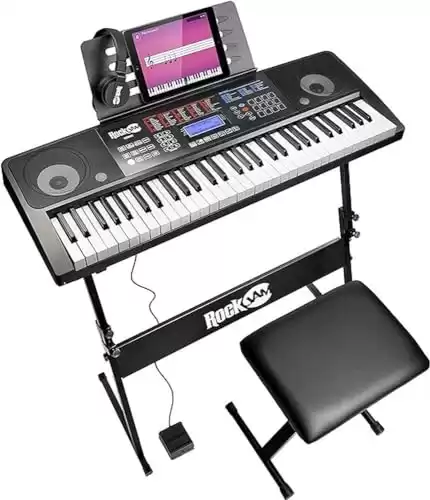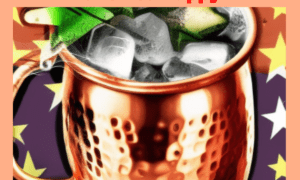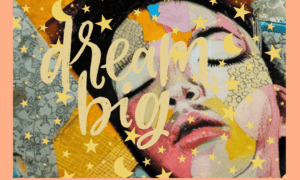 Buy a Musical Instrument Day is today!
Buy a Musical Instrument Day is today!
Music has a unique ability to transport us to different times and places, to evoke emotions we may have forgotten or never known. That’s why there is a special day dedicated to celebrating the joys of playing music: Buy a Musical Instrument Day! Whether you already know your way around a keyboard or are just starting to strum a guitar, this is the perfect opportunity to invest in a new instrument and explore the incredible world of music.
So why wait? Celebrate Buy a Musical Instrument Day by picking up that saxophone or ukulele you’ve always dreamed of playing and let the music take you away!
BUY A MUSICAL INSTRUMENT DAY: HISTORY OF MUSICAL INSTRUMENTS
From the primitive rhythms produced by banging rocks against each other to the intricate melodies of modern-day orchestras, music has been an integral part of our lives for centuries. While we may never know exactly when it all began, the oldest recorded evidence of a musical instrument dates back over 40,000 years ago.
The discovery of the Divje Babe flute, a bone flute found in present-day Slovenia, has sparked much speculation and fascination among archaeologists, musicians, and historians alike. The intricately carved instrument is believed to have been crafted by the Neanderthals, a species closely related to but distinct from modern humans. Despite its age, the Divje Babe flute still holds the power to inspire awe and wonder at the thought of the beautiful melodies that may have been played on it so long ago.
Celebrate Buy a Musical Instrument Day! What have you always wanted to play?
BUY A MUSICAL INSTRUMENT DAY: 100 BENEFITS OF PLAYING MUSICAL INSTRUMENTS
- Enhances Cognitive Abilities: Playing musical instruments can improve cognitive functions such as memory, attention, and problem-solving skills.
- Boosts Mood: Engaging in music-making releases endorphins, promoting feelings of happiness and well-being.
- Improves Coordination: Playing an instrument requires coordination between hands, eyes, and sometimes feet, enhancing motor skills.
- Reduces Stress: Music has a calming effect on the nervous system, reducing stress levels and promoting relaxation.
- Increases Discipline: Regular practice instills discipline and commitment, leading to improved time management skills.
- Enhances Concentration: Focusing on playing music improves concentration and attention span.
- Fosters Self-Expression: Playing allows individuals to express themselves creatively and emotionally.
- Promotes Social Bonding: Joining ensembles or bands fosters social connections and teamwork.
- Boosts Confidence: Mastering an instrument builds self-confidence and self-esteem.
- Improves Respiratory Health: Wind instruments strengthen respiratory muscles and improve lung capacity.
- Enhances Listening Skills: Playing music trains the ear to discern pitch, tone, and rhythm, improving listening abilities.
- Fosters Patience: Learning an instrument requires patience and perseverance, teaching the value of persistence.
- Promotes Cultural Appreciation: Learning different types of music exposes individuals to diverse cultures and traditions.
- Encourages Creativity: Experimenting with melodies and harmonies sparks creativity and innovation.
- Improves Academic Performance: Studies show a correlation between musical training and academic achievement.
- Strengthens Memory: Memorizing music pieces enhances both short-term and long-term memory.
- Enhances Emotional Intelligence: Playing music helps individuals recognize and regulate their emotions.
- Provides a Sense of Achievement: Reaching musical milestones provides a sense of accomplishment and satisfaction.
- Promotes Multitasking: Coordinating different elements of music simultaneously enhances multitasking abilities.
- Improves Hand-Eye Coordination: Playing instruments like piano or guitar enhances hand-eye coordination and dexterity.
- Fosters Lifelong Learning: Music is a lifelong journey of discovery and growth, promoting continuous learning.
- Offers a Creative Outlet: Playing music serves as a creative outlet for expressing thoughts and emotions.
- Enhances Verbal Skills: Singing or playing instruments involving lyrics improves verbal fluency and pronunciation.
- Promotes Cultural Exchange: Sharing music with others facilitates cultural exchange and understanding.
- Improves Math Skills: Understanding rhythm and timing in music can improve mathematical abilities.
- Provides a Sense of Community: Joining music groups creates a sense of belonging and camaraderie.
- Strengthens Immune System: Listening to music or playing instruments can boost the immune system’s function.
- Promotes Physical Fitness: Playing energetic instruments like drums or dancing while playing promotes physical activity.
- Encourages Goal Setting: Setting musical goals and working towards them fosters goal-setting skills.
- Enhances Problem-Solving Skills: Figuring out difficult passages or improvising requires creative problem-solving.
- Improves Self-Discipline: Practicing regularly cultivates self-discipline and dedication.
- Promotes Brain Plasticity: Learning music stimulates brain plasticity, enhancing neural connections.
- Enhances Emotional Resilience: Playing music provides an outlet for processing and coping with emotions.
- Boosts Social Skills: Collaborating with other musicians improves social interaction and communication.
- Provides a Sense of Identity: Identifying as a musician contributes to a sense of self-identity and purpose.
- Promotes Mindfulness: Playing music encourages mindfulness and being present in the moment.
- Facilitates Cultural Preservation: Learning traditional music helps preserve cultural heritage and traditions.
- Offers Stress Relief: Playing instruments can serve as a form of stress relief and relaxation.
- Strengthens Fine Motor Skills: Playing instruments like violin or flute requires precise finger movements, enhancing fine motor skills.
- Promotes Academic Motivation: Excelling in music can boost motivation and confidence in other academic subjects.
- Enhances Social Support: Being part of a musical community provides social support and encouragement.
- Improves Speech Fluency: Singing or playing wind instruments can improve speech fluency and articulation.
- Fosters Adaptability: Learning different styles of music fosters adaptability and versatility.
- Encourages Cultural Exploration: Learning music from different cultures encourages exploration and appreciation of diversity.
- Improves Time Management: Balancing practice sessions with other commitments teaches effective time management.
- Boosts Resilience: Overcoming challenges in music builds resilience and perseverance.
- Enhances Decision-Making Skills: Making musical decisions, such as phrasing or interpretation, hones decision-making abilities.
- Provides Emotional Outlet: Music offers a safe and constructive outlet for processing and expressing emotions.
- Promotes Active Listening: Playing music encourages active listening and engagement with sound.
- Enhances Non-Verbal Communication: Playing music with others improves non-verbal communication and cooperation.
- Fosters Cultural Understanding: Learning music from different cultures fosters empathy and cultural understanding.
- Improves Posture: Holding instruments correctly promotes good posture and spinal alignment.
- Boosts Brain Health: Playing music stimulates brain activity and may reduce the risk of cognitive decline.
- Encourages Lifelong Relationships: Connecting with other musicians fosters lifelong friendships and relationships.
- Enhances Social Skills: Playing in ensembles improves social skills such as teamwork and cooperation.
- Promotes Positive Coping: Music provides a healthy outlet for coping with stress and challenging emotions.
- Encourages Self-Expression: Playing music allows individuals to express themselves authentically.
- Improves Emotional Regulation: Music-making teaches emotional regulation and control.
- Promotes Spatial Awareness: Understanding musical structures improves spatial awareness and visualization.
- Enhances Self-Esteem: Achieving musical goals boosts self-esteem and confidence.
- Fosters Lifelong Friendship: Playing music with others creates bonds that can last a lifetime.
- Encourages Active Participation: Music encourages active participation rather than passive consumption.
- Improves Auditory Discrimination: Distinguishing pitch, tone, and rhythm improves auditory discrimination skills.
- Promotes Resilience: Overcoming musical challenges builds resilience and perseverance.
- Enhances Social Connectedness: Playing music with others fosters a sense of belonging and connectedness.
- Encourages Cooperation: Collaborating with other musicians teaches cooperation and teamwork.
- Enhances Empathy: Music fosters empathy and understanding towards others.
- Improves Mental Health: Engaging in music-making can improve mental health and well-being.
- Promotes Social Inclusion: Music brings people together across diverse backgrounds and experiences.
- Fosters Collaboration: Music-making requires collaboration and cooperation with others.
- Promotes Cultural Exchange: Music facilitates cultural exchange and understanding.
- Enhances Self-Awareness: Playing music encourages self-reflection and self-awareness.
- Encourages Mindfulness: Music-making promotes mindfulness and presence in the moment.
- Improves Motor Skills: Playing instruments requires precise motor control and coordination.
- Promotes Emotional Expression: Music provides a medium for expressing and processing emotions.
- Enhances Academic Performance: Learning music can improve academic performance in other subjects.
- Encourages Lifelong Learning: Music is a lifelong journey of discovery and growth.
- Enhanced Dental Health: Wind instrument players often develop stronger facial muscles, which can contribute to better dental health.
- Heightened Sense of Touch: String instrument players develop heightened tactile sensitivity in their fingertips, enhancing their sense of touch.
- Increased Lung Capacity: Playing wind instruments can expand lung capacity and improve respiratory health.
- Sharper Peripheral Vision: Drummers often develop sharper peripheral vision due to the need to coordinate limb movements.
- Enhanced Fine Motor Skills: Playing instruments like the piano or violin can lead to improved fine motor skills and hand-eye coordination.
- Boosted Immune System: Engaging in music-making activities can boost the immune system, leading to fewer illnesses.
- Improved Balance: Balancing instruments like the saxophone or clarinet can improve overall body balance and coordination.
- Stress Reduction in Pets: Playing calming music can reduce stress and anxiety in household pets, creating a more peaceful environment.
- Enhanced Hearing: Musicians may develop enhanced auditory perception, allowing them to discern subtle nuances in sound.
- Improved Digestion: Playing certain instruments can stimulate abdominal muscles and aid digestion.
- Enhanced Problem-Solving Skills: Musicians often develop creative problem-solving skills through improvisation and composition.
- Increased Tolerance to Pain: Playing instruments can increase pain tolerance levels, possibly due to the release of endorphins during music-making.
- Enhanced Sense of Smell: Wind instrument players may develop a heightened sense of smell due to increased airflow through nasal passages.
- Improved Sleep Quality: Engaging in relaxing music-making activities before bed can promote better sleep quality and duration.
- Increased Intuition: Musicians may develop heightened intuitive abilities, possibly due to increased sensitivity to subtle changes in sound and rhythm.
- Reduced Risk of Seasonal Allergies: Playing wind instruments may help strengthen respiratory health and reduce susceptibility to seasonal allergies.
- Stimulated Creativity in Other Areas: Engaging in music-making activities can stimulate creativity in unrelated areas, such as problem-solving or artistic endeavors.
- Enhanced Digestive Health: Playing certain instruments can stimulate abdominal muscles and promote healthy digestion.
- Improved Plant Growth: Some studies suggest that playing classical music near plants can enhance their growth and overall health.
- Reduced Risk of Motion Sickness: Musicians who regularly practice coordinating movements between their hands and eyes may experience reduced susceptibility to motion sickness.
- Improved Memory Recall: Engaging in music-making activities can improve memory recall abilities, aiding in academic and professional pursuits.
- Increased Sensory Integration: Playing instruments involves integrating auditory, visual, and tactile sensory inputs, leading to improved sensory processing abilities.
- Reduced Risk of Seasonal Affective Disorder (SAD): Engaging in music-making activities can elevate mood and reduce symptoms of seasonal affective disorder during winter months.
HOW TO CELEBRATE BUY A MUSICAL INSTRUMENT DAY
Unlock your musical potential on National Buy a Musical Instrument Day! Discover the joy of music-making by investing in a new instrument. Whether you’re a seasoned musician or a beginner, explore a wide range of options to embark on a melodious journey. Celebrate the beauty of music and let your creativity soar with the perfect instrument for you.
- Buy a musical instrument, of course! Keyboards, guitar, percussion, wind instruments
- Take some music lessons.
- Make your own rain stick.
- Explore over 200 musical instruments – virtual encyclopedia.
- If you love the article image, purchase it on these fun products on Zazzle!
- Download the 38 Hertz Celebration Book with 365 days of celebrations!
BUY A MUSICAL INSTRUMENT DAY FEATURED PRODUCT
 RockJam 61 Key Touch Display Keyboard Piano Kit with Digital Piano Bench, Electric Piano Stand, Headphones Piano Note Stickers, Sustain Pedal & Simply Piano Lessons
RockJam 61 Key Touch Display Keyboard Piano Kit with Digital Piano Bench, Electric Piano Stand, Headphones Piano Note Stickers, Sustain Pedal & Simply Piano Lessons
Note: If the above links do not direct you to the appropriate referral on the first try, return to the article and try again.
Do you have any ideas about how to celebrate Buy a Musical Instrument Day? Please share them!












